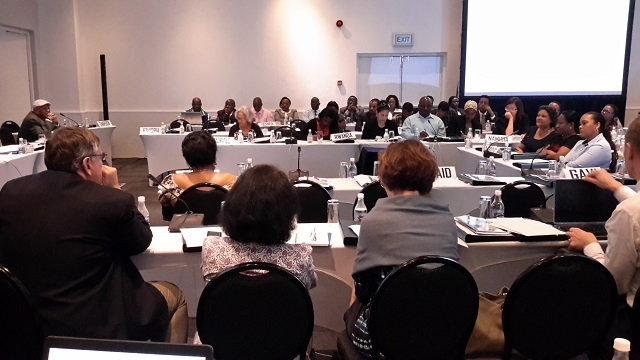Workshop on Exchange of Best Practices to Reaching Every District/Community, equity and integration of child survival interventions in ESA commences
 Cape Town, 25 January 2016 – A historic five-day workshop organized jointly by WHO, UNICEF and JSI, MCSP/USAID on Exchange of Best Practices to Reaching Every District/Community (REC), equity and integration of child survival interventions in East and Southern African (ESA) kicked off on Monday 25 January, 2016 in Cape Town, South Africa.
Cape Town, 25 January 2016 – A historic five-day workshop organized jointly by WHO, UNICEF and JSI, MCSP/USAID on Exchange of Best Practices to Reaching Every District/Community (REC), equity and integration of child survival interventions in East and Southern African (ESA) kicked off on Monday 25 January, 2016 in Cape Town, South Africa.
In his opening remarks, World Health Organization Representative for Zimbabwe, Dr David Okello, who spoke in his capacity as acting Inter-country Support Team Coordinator for East and Southern African countries called on the ESA countries to learn from each other's experience with proven life-saving interventions to ensure that children's lives are saved through integration of child survival interventions.
“It is gratifying to note that this workshop will provide opportunity to learn from experiences about what works in our region and other regions, how it worked and in what context it worked,” Dr Okello said.
The workshop which brought together about 150 delegates from Ministries of Health child health and immunization programmes, partner organizations namely, WHO, UNICEF, USAID Washington, JSI, MCSP/USAID, CDC, Bill and Melinda Gates Foundation, Sabin Vaccine Institute, the Gavi Alliance, CHAI and PATH, is aimed at documenting the best practices to inform operational framework development that will be implemented in countries in the sub region.
Dr Okello urged ESA countries and partners to use lessons learnt from various countries to identify the most practical ways of improving equitable access to children and marginalized communities using the RED approach for delivery of integrated child survival packages. He reiterated that there was need to go beyond immunization and to provide holistic health care for the survival of mothers and children.
“Despite overall great improvements in immunization coverage across the sub-region, children still continue to die of other preventable and easily treatable causes. We therefore need, while maintaining the gains of immunization, to look beyond immunization and actively promote other effective interventions to prevent childhood deaths and improve their survival,” Dr Okello said.
The workshop was organized and conducted in the spirit of the WHO Transformation agenda which covers four core areas: pro results values, smart technical focus, responsive strategic operations and effective communications within WHO and partners. Dr Okello pointed out that the Best Practice exchange workshop focused mostly on effective communication and partnerships towards improving child survival in ESA.
Speaking at the same occasion Dr Nasir Yusuf who spoke on behalf of UNICEF/ESARO, said his organization shared the common concerns by immunization and child survival stakeholders to address the gaps in immunization coverage and other child survival interventions. He stressed the need to identify the unreached and marginalized children who are continually missed by immunization activities despite efforts such as the RED strategic approach, Child Health Days or Periodic Intensified Routine Immunization Interventions.
“It is our hope therefore that the rich deliberations and exchanges of ideas during the five day workshop will result in the necessary ingredients for the development of policies, frameworks, guidelines and tools which countries can adapt for use in their efforts to improve their routine immunization, addressing inequity in the delivery of immunization using the platform for the integration of other child survival interventions.
In her address Ms. Sarah Zizzo from USAID African Bureau (funders of USAID /MCSP) pledged her organization's support to all efforts to improve immunization coverage and child survival intervention in ESA.
At the end of the workshop countries are expected to apply best practices shared to develop draft Reaching Every District approach that is zoomed out to reach communities with among others using equity gap analysis to inform community-health facility level micro-planning for equitable access to integrated child survival interventions. Partners are also expected to pledge technical and financial support the country plans to allow smooth implementation of the plans.
The RED Strategic approach developed in 2002 has been refined over the years and in countries where it was operationalized, it has been proven to help in reaching the unreached communities with immunization and other child survival interventions. The expected updated RED approach for equitable and integrated delivery of child survival interventions is expected to feed bottom up the development of a Regional Framework for equitable and integrated delivery of child survival interventions, pulling together Regional and Global strategic frameworks such as the GAPPD, GVAP, Regional Immunization Strategic Plan, Regional Strategic Framework for Integrating Child Survival Interventions with Immunization and the Regional framework for evaluation and monitoring of child health services.
___________________________________________
For more information contact:
Dr Fussum Daniel, Email: danielf [at] who.int
Dr. Teshome Desta, Email: destawolde [at] who.int
Dr Folake Olayinka, Email: folake_olayinka [at] jsi.com
Dr Nasir Yusuf, Email: nayusuf [at] unicef.org


